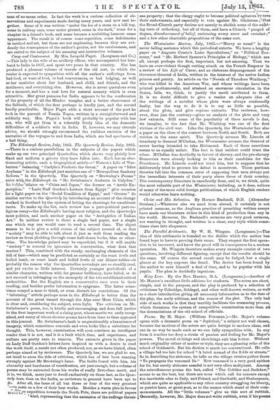The Westminster Review, July, 1865.—" Heavy as usual" is the
never failing sentence which this periodical extorts. We have a lengthy paper on "Auguste Comte's Later Speculations," on "Political Eco- nomy," and "Mr. Herbert Spencer's Principles of Biology," which are all, except perhaps the first, important, but not amusing. Then we have an over-violent though cutting attack on the French Emperor in a review of his Life of Ccesar, and an elaborate disparagement of the Governor-General of India, written in the interest of the native Indian princes and gentry. An article on the "Novels of Theodore Winthrop," who was killed in the American War, and whose writings have been printed posthumously, and attained an enormous circulation in the States, fails, we. think, to justify the merit attributed to them. It is no doubt difficult to give a reader an adequate idea of the writings of a novelist whose plots were always confessedly faulty, but the way to do it is to say as little as possible, about the plots, and give copious extracts. The reviewer, how- ever, does just the contrary—gives an analysis of the plots and very few extracts. Still some of the popularity of these novels is due, we imagine, to the fact that Mr. Winthrop was one of the first victims of the civil war. Like the Quarterly, the Westminster has also a paper on the close of the contest between North and South. Both are written in the same spirit. The Quarterly accuses Mr. Lincoln of treachery to General M'Clellan, the Westminster accuses the General of never having intended to take Richmond. Each of these assertions seems to us equally unfair. The fact is that neither could trust the other. M'Clellan was decidedly in favour of slavery, and the pro-slavery Democrata were already looking to him as their candidate for the Presidency. Mr. Lincoln could not trust him, but to suppose that he deliberately tried to procure his defeat is monstrous. These partizan theories fall into the common error of supposing that men always put the immediate interests of their party above those of their country. The contemporary literature is excellently done, and is, we think, quite the most valuable part of the Westminster, including, as it does, notices of many of the more solid foreign publications, of which English readers would otherwise learn nothing.






























 Previous page
Previous page